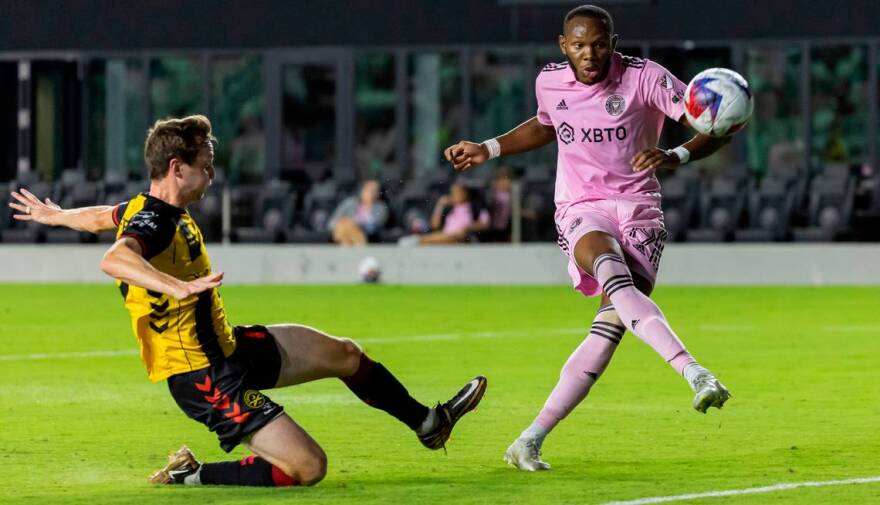COMMENTARY Soccer legend Lionel Messi's decison to play for Inter Miami will be historic — but only if Miami and its Latino fan base can discard their historic indifference to local professional fútbol.
Wednesday's news that soccer GOAT Lionel Messi will now play for Inter Miami CF is the biggest thing to hit our mangroves since Henry Flagler brought his railroad tracks. Bigger than LeBron James deciding to “take my talents to South Beach.” Bigger than Rico Tubbs coming to partner with Sonny Crockett.
And yet I fear that this, the most exciting moment in U.S. soccer since Brandi Chastain ripped her jersey off at the Rose Bowl, will turn out to be the most anti-climactic.
Believe me, as a longtime Miami resident and an ardent soccer fan, no one hopes more than I do that Messi’s arrival will finally make this a soccer town. But that’s just the problem: this is not a soccer town — and I’m not completely sure even Messi Magic can change that.
READ MORE: Ann ale, Grenadiers! The Haitian women's soccer team is the Haiti we should root for
Sure, we sell out international friendly matches at Hard Rock Stadium, especially if top-flight Spanish club teams like Real Madrid and Latin American national sides like Messi’s Argentina are playing. But this is not a city or a region that has ever really, appreciably backed its own professional soccer franchise. And that’s because the most important soccer fan base here — Latinos — care only for the teams that they and their parents and grandparents left behind in Mexico, Central America, South America and the Caribbean.
To them, Major League Soccer, and any MLS team South Florida has fielded — even Inter Miami and its superstar owner, David Beckham — is just a gringo wannabe effort. Like me dancing salsa or Rick Scott speaking Spanish. OK, the Senator’s español has gotten better lately. But your average Hondurans, Colombians or Trinidadians in Miami are about as enthusiastic about the local fútbol club as they are about eating baleadas, buñuelos or curry crab made by McDonald’s.
Miami has never really backed its own pro soccer club — because its most important fan base, Latinos, care only for their teams back in Latin America.
They’ve often told me so. Just about every guy I play soccer with at Coral Reef Park was born in Latin America and the Caribbean or is first-generation American. When they show up each Sunday afternoon they’re wearing the jerseys of Barcelona in Spain or Chivas in Mexico or Flamengo in Brazil. I recently asked them: "Why not Inter Miami?" They laughed so hard they pulled groin muscles.
One factor may be the civic alienation of Miami — where Latinos are the majority but tend to reside in balkanized bubbles. Why do Mexicans in Los Angeles seem to back their MLS teams, the Galaxy and LAFC, as if every game were Cinco de Mayo, yet most Brazilians in South Florida treat Inter Miami like overcooked picanha? Some of it’s due to the fact that the Angelenos feel a certain investment in their wider community that Latinos in tribal, transient Miami often don’t (and, admittedly, other ethnic groups here don’t either).
Dismal history
I’ll be the first to admit a legend as massive as Messi — a demigod who represents all those soccer Valhallas that Miami Latinos worship — could galvanize their interest in Inter Miami. (He better, since the deal makes him the highest-paid athlete in the U.S.) Still, while I believe Beckham’s MLS enterprise stands a better chance of success here than its failed predecessors — a dismal history my WLRN colleague Matheus Sanchez has summarized — even Messi may face an uphill climb here.

And Latino indifference isn’t the only reason. Miami’s generally elitist soccer culture is another.
In many large U.S. cities, like Los Angeles, the development of soccer talent has in recent years become more democratic — meaning, there’s finally been outreach to more low-income youths and kids of color. Miami, by contrast, has largely remained stuck in white, suburban soccer clubbiness. I experienced it myself when I was a youth coach here and tried to assemble teams from a variety of racial and economic backgrounds in our South Dade community — only to hear referees make snide comments about how I was wasting my time.
Until that also changes, Inter Miami’s fan base — with or without Messi — is going to stay limited compared to the audience the Dolphins, Heat, Marlins and even Panthers enjoy. Which is why my main advice to Messi, besides entreating fellow Latinos to back Inter Miami, is to start soccer clinics in the city’s Black community.
That, too, would be one of the biggest things to ever hit Miami.






